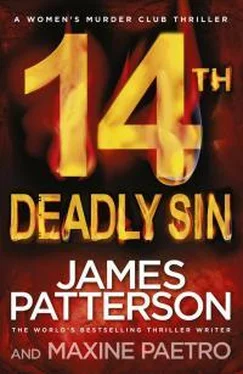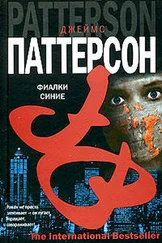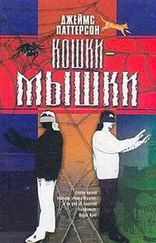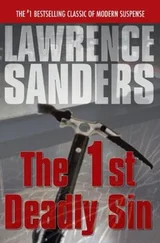“You call Conklin. I’ll call Swanson and Vasquez. Clapper is at the scene right now,” he said, referring to my friend the forensics lab director.
Brady stared into his coffee mug and said, “Look, Lindsay. I know I’ve been a dick lately. I’m worried about all this renegade-cop shit going down. I don’t mean to take it out on you. And I’m sorry.”
His voice caught in his throat. That was Brady apologizing.
“It’s OK. I totally understand.”
“I’m on your side. Always.”
I smiled at him. He smiled back. Sometimes I dislike Brady, and sometimes I love him. Right now, I loved him. Before someone started to tear up, he gave me the crime scene coordinates and told me to check it out and to call him every hour.
When he had gone, I texted Conklin.
He texted back.
We arrived at Wicker House within ten minutes of each other. After touring the bloodbath, my partner said, “I have a hard time believing cops did this. ”
Four of the seven dead men were unarmed, and spent brass littered the floors and stairwell.
Swanson, Vasquez, Conklin, and I were looking over the CSIs’ shoulders when Clapper came over to me and said, “We’ve got more prints than a frame shop. As for the casings, we’ve got all kinds. From the position of the bodies, it looks to me like the shooters had the advantage of surprise. And they used suppressors.”
Then Clapper nicely told us we were in the way.
“As soon as I know anything, I’ll call you,” he said.
CHAPTER 42
IT WAS JUST after 5 a.m. and Donnie Wolfe was parked on a free-parking residential street in the Inner Sunset neighborhood.
He was leaning against the hood of his red 2003 Camaro. There were attached houses on both sides of Twelfth Avenue, short flights of steps up to the front doors, slopes down to the garages, almost an apple-pie-and-baseball feel to it.
He’d been out all night and was talking to his girl on the phone, saying, “I was working late, Tamra. You just pack everything you need for a couple of days and don’t talk to your friends. Do not talk to your mother, or that stupido downstairs. I got a couple of meetings and then I’m coming home to sleep. And then we’re outta here.”
Tamra was pregnant. Twenty weeks. Donnie didn’t tell her his business, and she was cool. But obviously, she didn’t like breezing out of town on the sneak, not knowing where they were going and not telling her mother, neither.
“It’s going to be beautiful, Tam,” he said. “Trust me. Don’t talk. Pack. Chill.”
The gray Ford was coming up on him, slowing and parking right behind his ass. Donnie pulled on his shirttails, making sure they covered the piece he’d stuck in his waistband. Then he got out of his car and walked toward the man he knew as One.
“How you make out? Everything good?” Donnie asked the stocky man wearing big shades and a ball cap pulled down low over his eyes.
“That’s close enough,” One said to his inside man at Wicker House. Donnie stopped walking and showed his empty hands.
One asked, “Where’s your buddy?”
“Rascal’s cool,” Donnie said. “He’s staying out of sight.”
One nodded. He said, “Here’s your go bag.” He reached over to the passenger seat, then tossed a black nylon duffel bag though the open window to Donnie.
Donnie caught the bag, stooped to the sidewalk, and unzipped it. There was a pair of Colorado plates at the side of the bag, which was filled with stacks of banded used bills.
The kid riffled through the money. It looked good and like it added up to the agreed-upon hundred thousand, his cut and Rascal’s.
He said to One, “So I guess this is bye-bye.”
“As long as you keep quiet. Don’t make me come looking for you.”
“The big boss—”
“The last I saw of the big boss, he had a mouthful of carpeting.”
“Not Mr. Royce,” said Donnie. “I’m talking about his boss, man. The King. He has an idea who you are. So don’t blame me for that.”
“I know who he is, too,” said One. “And I know where he lives.”
“Not my boss and not my problem,” said Donnie. “I’m good. I’m checking out. I got plans.”
“Your first plan should be to ditch that flashy car,” said One. “Be careful, Donnie.”
Donnie said, “Back at you, Mr. One. Adios. Take care.”
Donnie got into his car and watched through his rearview mirror until One drove off. Then he took the duffel bag and walked up the block and across the street to the car repair shop on Judah Street, which didn’t open for another three hours.
He went behind the garage and picked out a blue Honda Civic, not new, not old, just right. The car wasn’t locked. There were no keys, but he’d been boosting cars since he could walk. This was cake.
He hot-wired the engine. Then he got out of the Civic and changed the license plates to the Colorado ones from One. Passing his Camaro on the street, Donnie waved good-bye to his flashy car and drove the Honda east toward the Bay Bridge.
CHAPTER 43
AFTER CHARLIE CLAPPER had shooed us out of his crime scene, Conklin and I returned to our desks in Homicide, where we spent the morning reviewing Narcotics’ footage of the street in front of Wicker House.
At 2:34 a.m. precisely, before the shooting went down, two men had left Wicker House by the front door. They were wearing street clothes: jeans, a dark jacket on one, a light jacket on the other. One of the men was tall and wide, the other smallish and skinny.
The two men each had a quick smoke outside before bumping fists and getting into their cars.
The skinny one got into a red 2003 Camaro registered to Donald Francis Wolfe. The heavyset guy got into a brown 1997 Buick wagon belonging to Ralph Valdeen. Both men were in their twenties and Wolfe had an arrest record ranging from attempted home burglaries to possession to assault. He had also done time as a juvie for car theft.
As we’d been told, at 3:12 a.m., the surveillance crew had captured a split-second clip of a white panel van with three unidentifiable men inside—one of whom could be seen in the camera-side passenger seat and might have been wearing an SFPD jacket. The van was speeding past the front of Wicker House. Looked like mud had been smeared over the license plates.
We saw that clip for ourselves now, forward, backward, zoomed in, paused, and enhanced, and there was no way at all that we could ID any of the three men in the van, not in that light. SFPD Windbreakers? Maybe. I saw what looked like white letters on dark blue or gray or black.
Clapper had reported that the surveillance camera at the back of Wicker House had been shot out and that no hard drive had been found inside the store, not a computer, nothing.
At about nine thirty this morning, Donald Wolfe’s red Camaro was called in for blocking a driveway on a residential street a block and a half from an auto repair shop. Then the guy who worked in that repair shop reported that a blue Honda Civic had been stolen and that the plates had been left in the backyard, which wasn’t covered by a security camera.
That meant that Wolfe had abandoned the Camaro and was now likely driving a blue Honda Civic with stolen plates.
An APB for the Honda and the Buick had paid off when both cars were sighted on the 101 Freeway just after three.
Conklin and I, with the help of SFPD Traffic Control, located the two vehicles in AT&T Park’s parking lot at half past three. The Giants were playing the St. Louis Cards, and it was a beautiful, sunny-streamy day. The lot was completely filled.
Conklin and I showed our badges and IDs and entered the stadium through the Willie Mays Gate. Even the worst seats in the ballpark had a view of the Bay Bridge, and from where we descended the field box steps, directly behind home plate, we could see the entire ballpark.
Читать дальше












